Remember When a Trump Airstrike Was Going to Start WW3?
That was only the tip of the iceberg of the awful coverage of the death of Soleimani, the Iranian terrorist the media turned into something of a folk hero.
Today’s newsletter focuses on two of the media’s weaknesses: making predictions about world events and greeting the passing of public figures.
In focus is Qasem Soleimani, an Iranian general who controlled a global terror network and was responsible for perhaps tens of thousands of deaths around the globe, including hundreds of American servicemembers.
He was killed by an air strike in January 2020 ordered by former President Donald Trump. The responses to that killing, and the predictions that it spawned, haven’t aged well. Neither have the ways that outlets described a brutal murderer whom they humanized in an effort to make Trump look bad.
With the death of another Iranian leader in the news, I wanted to revisit this media moment. I wasn’t prepared for how bad the coverage was.
Media coverage: The media cycle really started when Trump tweeted out an image of the American flag to celebrate the news of Soleimani’s killing. Whatever you think of the guy, taking out someone who killed American troops and then heralding the news by tweeting out an image of Old Glory is pretty badass.
The press, by contrast, were aghast. This wasn’t the way to conduct world affairs. MSNBC quickly organized a panel (look at all the faces) to say Trump ”overplayed his hand” and was making the world more dangerous.
CNN’s Christiane Amanpour called the move part of a policy that was “clear, present and dangerous.”
Perhaps the most outlandish came from Time magazine, who published guidance for how to talk to your child about the killing of an Iranian terrorist.
No, really.
Outlets climbed over one another to claim that a war with Iran—perhaps even World War III—was imminent.
Washington Post declared, “Trump plunges toward the kind of Middle Eastern conflict he pledged to avoid,” which went on to argue that Trump was “taking his presidency into just the kind of foreign entanglement he pledged to avoid.”
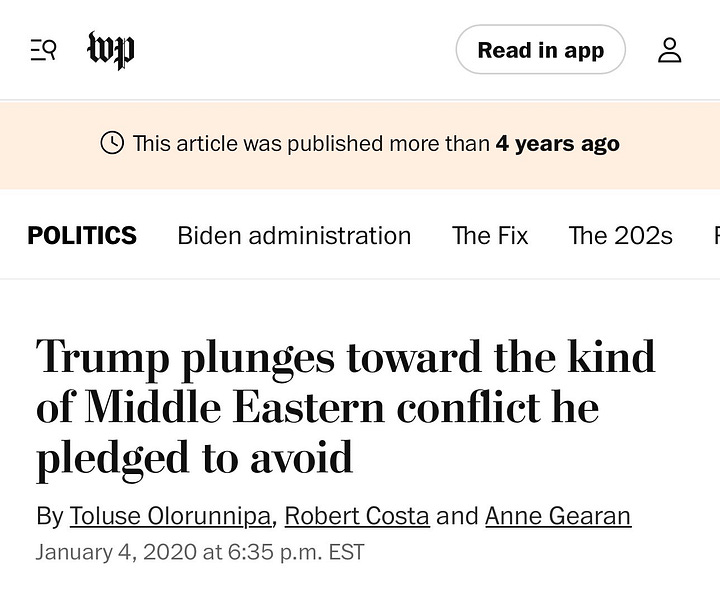
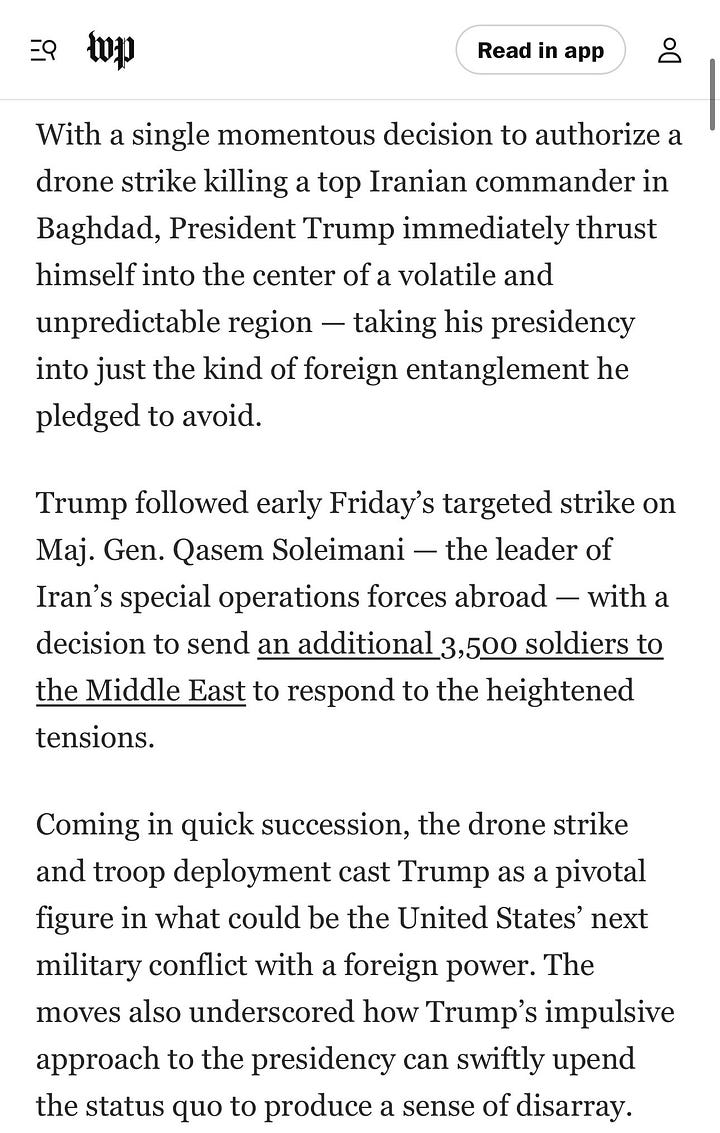
CNN likewise said his move “committed the United States to a risky open conflict.” Perhaps I had simply forgotten when that happened?


That same sentiment dotted headlines across the media. Here’s CNN (again), Business Insider, The Daily Show (“funny” men at it again), Reverend Al Sharpton (??), Vox and Teen Vogue.

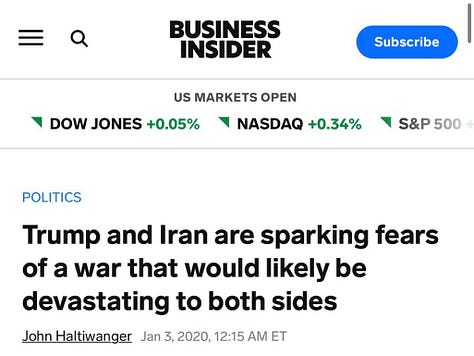


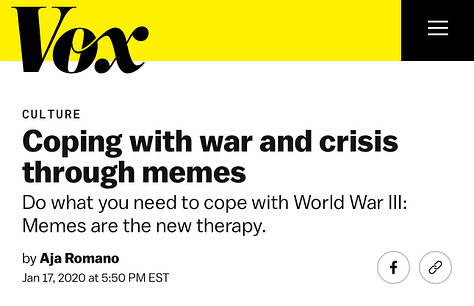

Others, like Vox and now-former MSNBC host Mehdi Hasan went further, claiming America was already at war, thanks to Trump’s recklessness.

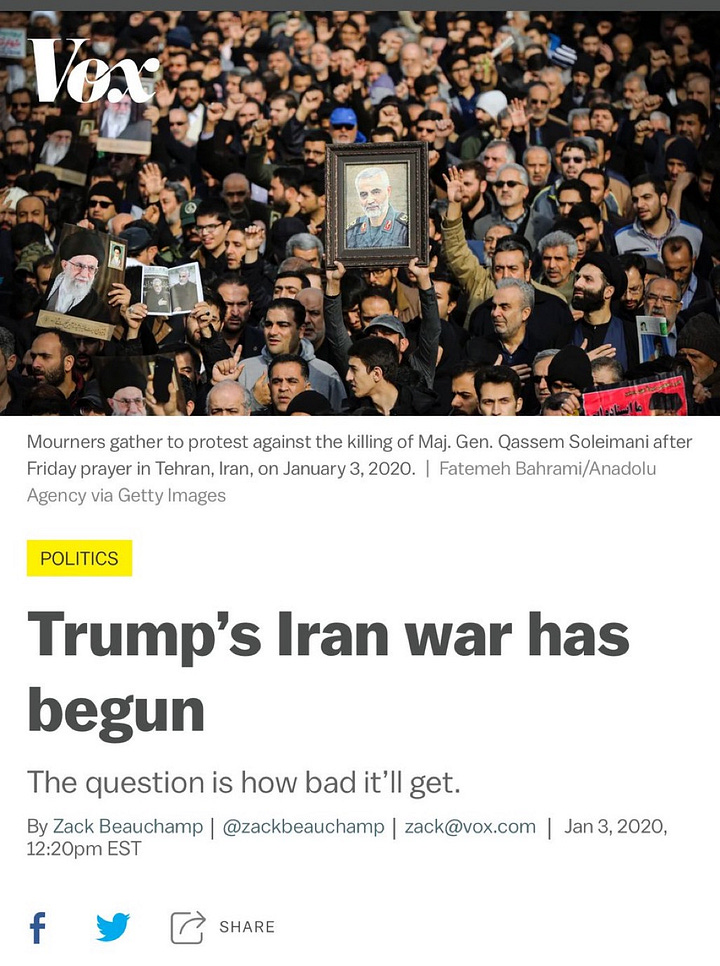
I wonder if NPR wondered why the foreign minister of Iran was so interested in talking to them? Maybe it was their fawning coverage to date? Doesn’t NPR still get tax-payer funding?


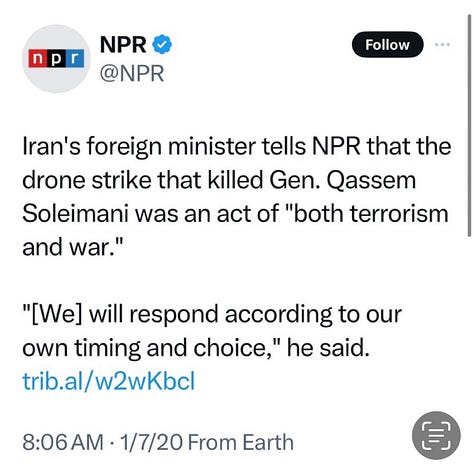
There were, on balance, some places who were more level-headed, like Politico (immediately after the strike, no less) and Brookings, who went against the grain and said that people were overhyping the move. In retrospect, that idea has, of course, held up well.

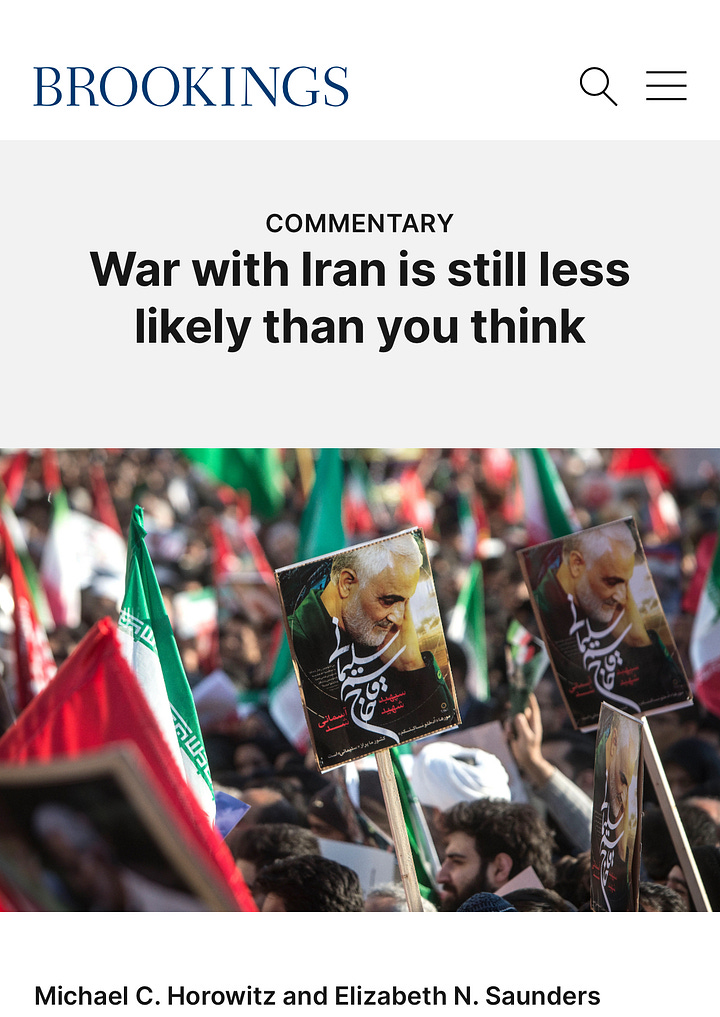
Especially because the war the media were so concerned about didn’t come to pass, like many of the press’s predictions about foreign policy during the Trump years. As I wrote a couple months ago at the Washington Free Beacon:
Well before Trump took office, news outlets started predicting the international order would not survive his presidency. He was too chummy with dictators and too mean to Europeans and the United Nations, they said. He doesn't listen to the experts, they gasped. Didn't he understand Iran and the Palestinians had to be appeased? A nuclear World War III was said to be just around the corner.
But where the coverage really came off the rails was around Soleimani himself. The brutal Iranian butcher reviled by countless Iranians and others in the region was reborn in death as something of a misunderstood folk hero. It was all Iranian propaganda—as even an NBC News op-ed pointed out—but that didn’t seem to matter. Outlets pumped out piece after piece about Soleimani’s funeral and the tears of the Ayatollah. Here’s NPR, Associated Press, and Reuters.



Again, this was all a flash of propaganda to build support for the terrorist-supporting regime in Iran. Why did places like PBS (“military icon”), New York Times (live updates??), and Washington Post promote it?



It wasn’t just headlines. Numerous outlets described the funeral as if it were for the main character of an action movie, like Iran’s James Bond had just died tragically. CNN said, “[m]any clasped their hands together in prayer and bowed before the casket, openly weeping.”


ABC News took great pains not only to include mentions of Soleimani as a “hero” but to promote actual Iranian propaganda about the crowd size. After pointing out that anyone who didn’t take part in this kabuki theater could be jailed or killed by the regime—I can’t believe I’m writing this—ABC said of the mourners: “[b]ut the emotion in the crowds was palpable.”
I’ve…got nothing.
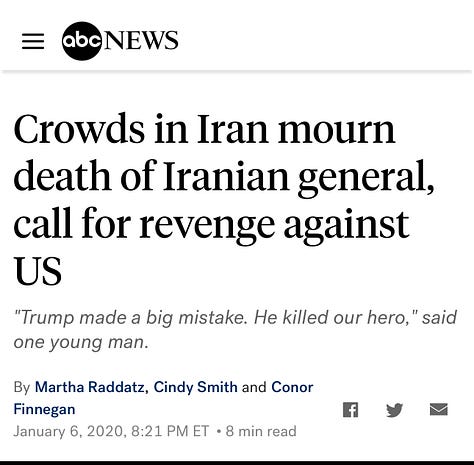
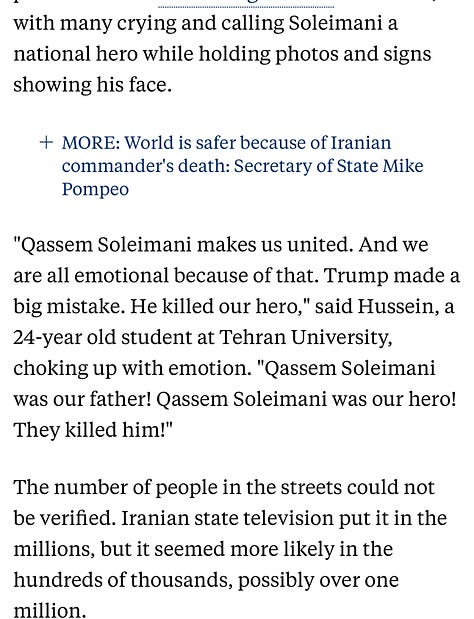

His obituaries were similarly unhinged. The media were so virulently anti-Trump that they made the man he had executed—a barbaric butcher who made a profession out of killing innocents for an evil regime—into a sympathetic figure.
The Associated Press called him an “icon” for killing Americans (really) and—I’m not making this up—said that Soleimani, a brutal terrorist who killed innocent civilians across the Middle East, “became known for his opposition to ‘meaningless deaths’ on the battlefield.”
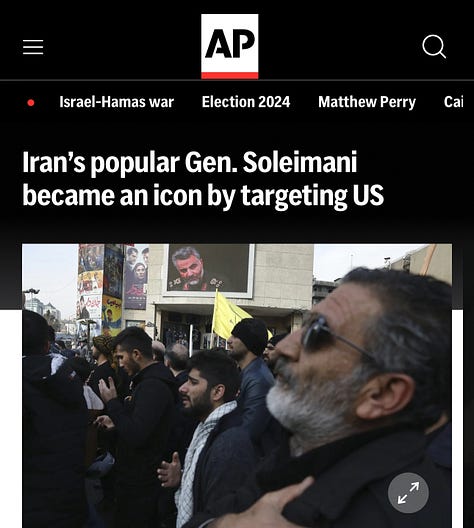

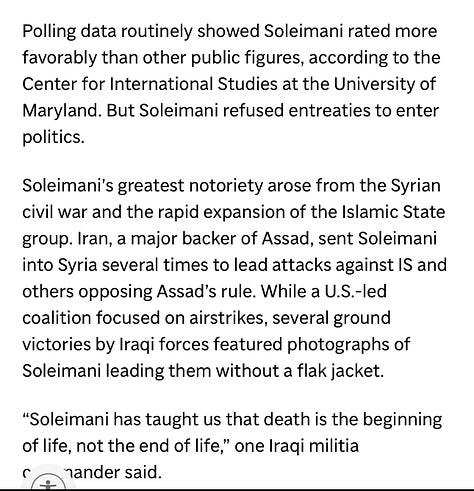
We saw a similar theme from the New York Times, who described Soleimani as a “master of Iran’s intrigue.” The piece continued, “[b]ut in Iran, many saw him as a larger-than-life hero.” Regime propaganda, right there in black-and-white, under NYT’s masthead.


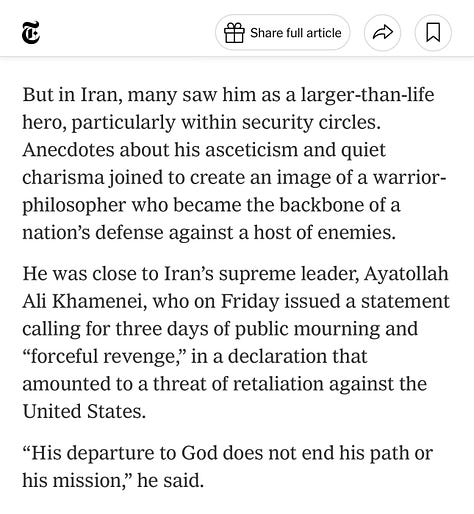
NBC News pointed out that Soleimani bravely fought ISIS—who wouldn’t hate ISIS?—before mentioning that the promotion of his fighting against ISIS was Iranian propaganda to convince the world that, as Iran’s vice president put it, "the slain general had dedicated his life ‘to fighting tyranny, oppression, terror and extremism.’”

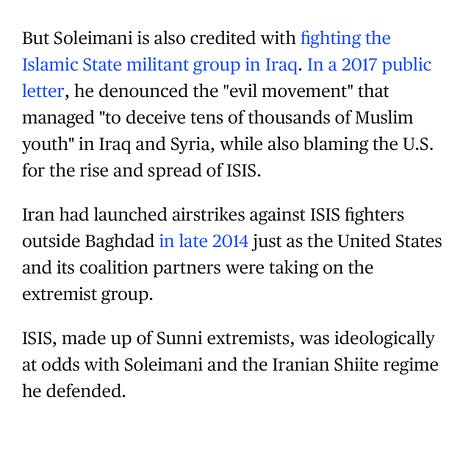

Again, why are outlets repeating Iranian propaganda as truth?
Back to the waxing poetic on the terrorist, though. The Telegraph called him “charismatic.” For Radio Free Europe, Soleimani was a “maverick.” (This headline, after all the others before it, broke me.)
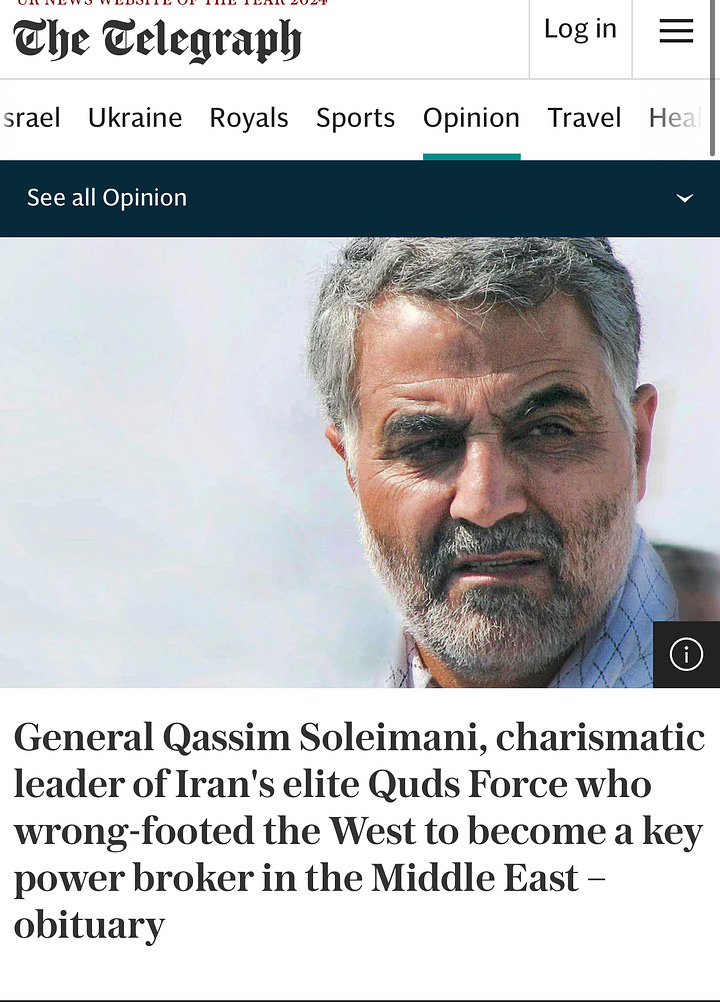

Washington Post took a different approach to humanizing Soleimani. This is a real tweet.
You’ve just gotta see this tweet from New York Times:
Even Iranian state T.V. took note of how much coverage the propaganda was getting. But I mean, could they have asked for more?
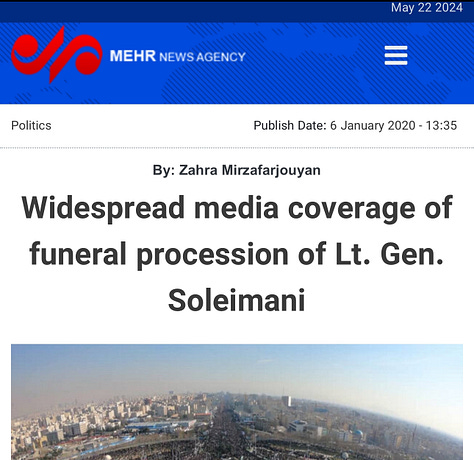
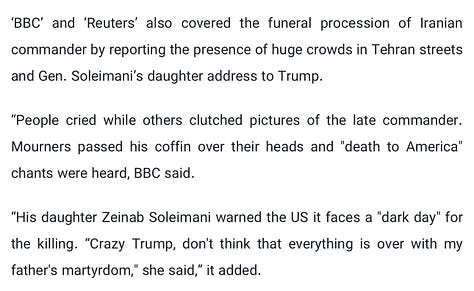
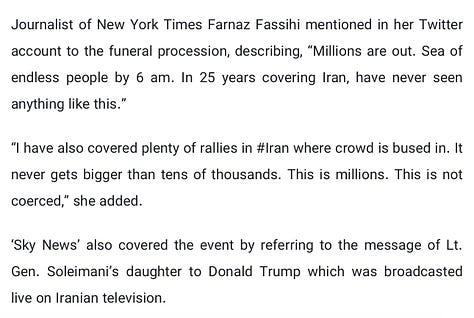
And if you think the media is simply given over to saying nice things about the recently deceased, let me disabuse you of that notion.
Here’s what some of those same outlets said about former conservative radio host Rush Limbaugh.
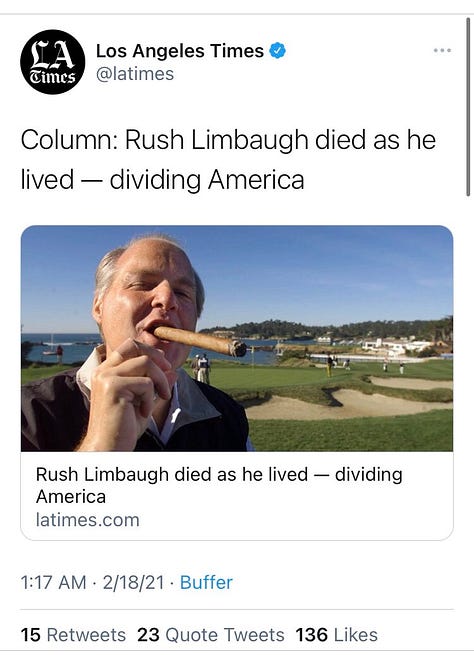


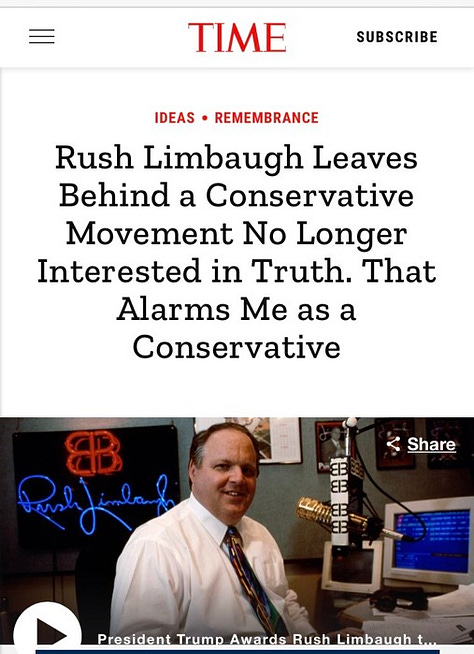
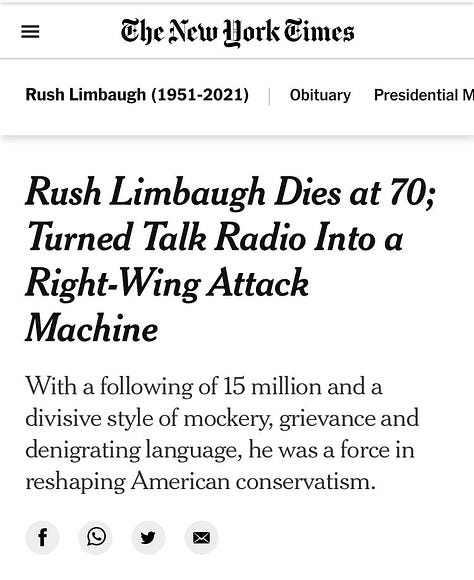

Knowing nothing else, who would you think was worse for humanity, Soleimani, or Limbaugh?
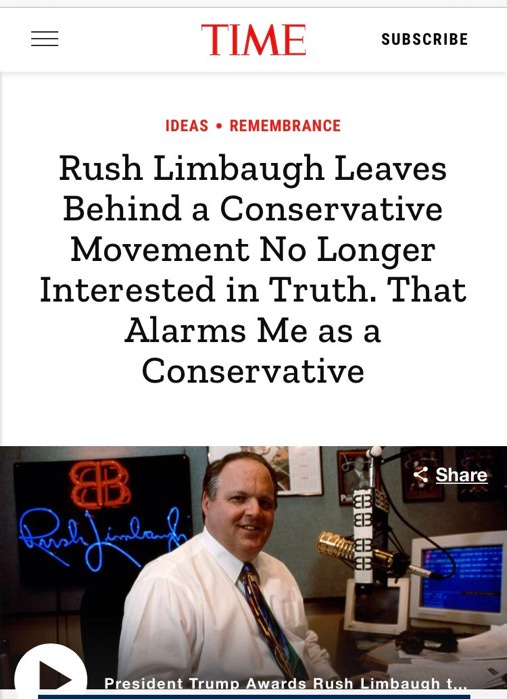

Takeaway: One of the reasons I wanted to launch this newsletter is because I fear we’re forgetting just how bad some of the media moments were over the last eight years or so. Going back to this coverage was jarring for me, as someone who keeps all the receipts etc. etc. I’ve got an excuse (in case you missed my last piece about brain cancer, its here) but I imagine some of you had a similar reaction.
The American press, in what they believed was the run-up to a war with a terrorist-supporting, human-rights-violating regime, openly promoted propaganda of said regime. My two cents is that they did it because the other side of the equation was someone they reviled even more: President Trump.
This might be the worst example of the media building up someone undeserving simply because they oppose Trump that I’ve encountered (and I’ve seen a few, Remember Michael Avenatti?). It took me a few extra days to get through this one in part because I just couldn’t believe my eyes. I saw old headlines and thought, no, surely there’s more to it.
There often was. It wasn’t exculpatory. Anything but.
I can’t imagine you need me to walk you through the broader phenomenon, the ways that the political beliefs of members of the media sometimes color their perspectives on world events. I think this side-by-side is emblematic of a blinkered press corp whose liberal leanings lead it to conclude that surely things aren’t what they appear to everyone else, outside of their bubble.
And the media doesn’t always get it right when it comes to morality, either. But who among us do?
Things were particularly bad during the Trump years, as the media seemed to order their moral universe around Trump. What he supported was evil, and what he opposed was sympathetic, at the least.
But morality isn’t bounded by what a certain president does or doesn’t like or do. With a potential second term approaching, the media would do well to remember that the next time a major public figure passes.
But perhaps the problem of promoting propaganda and obfuscating evil runs deeper than coverage of one Iranian death.
Until next time.







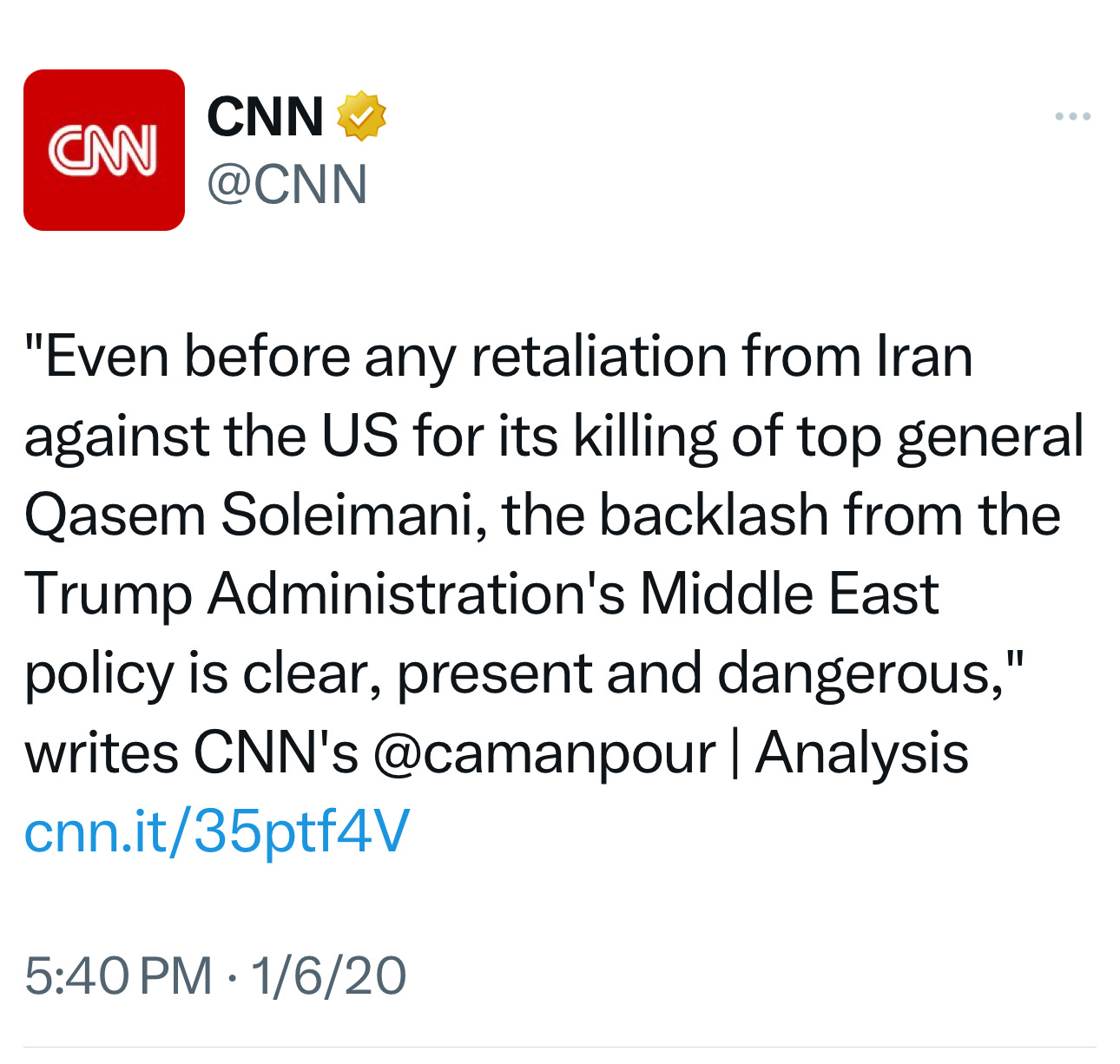
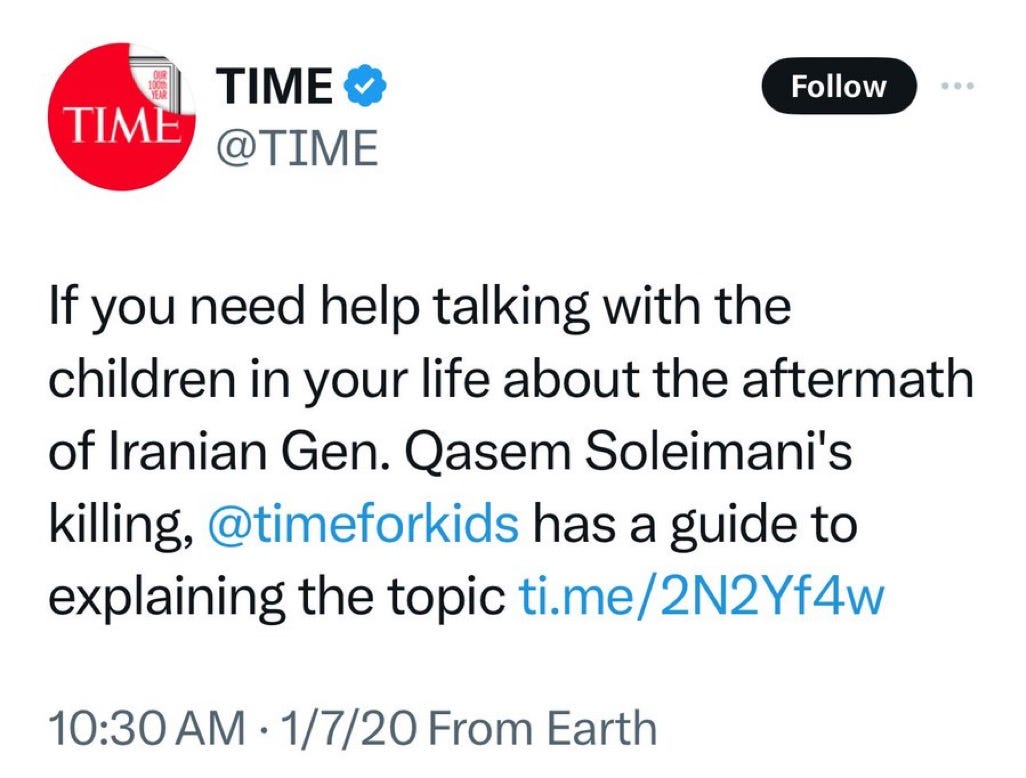
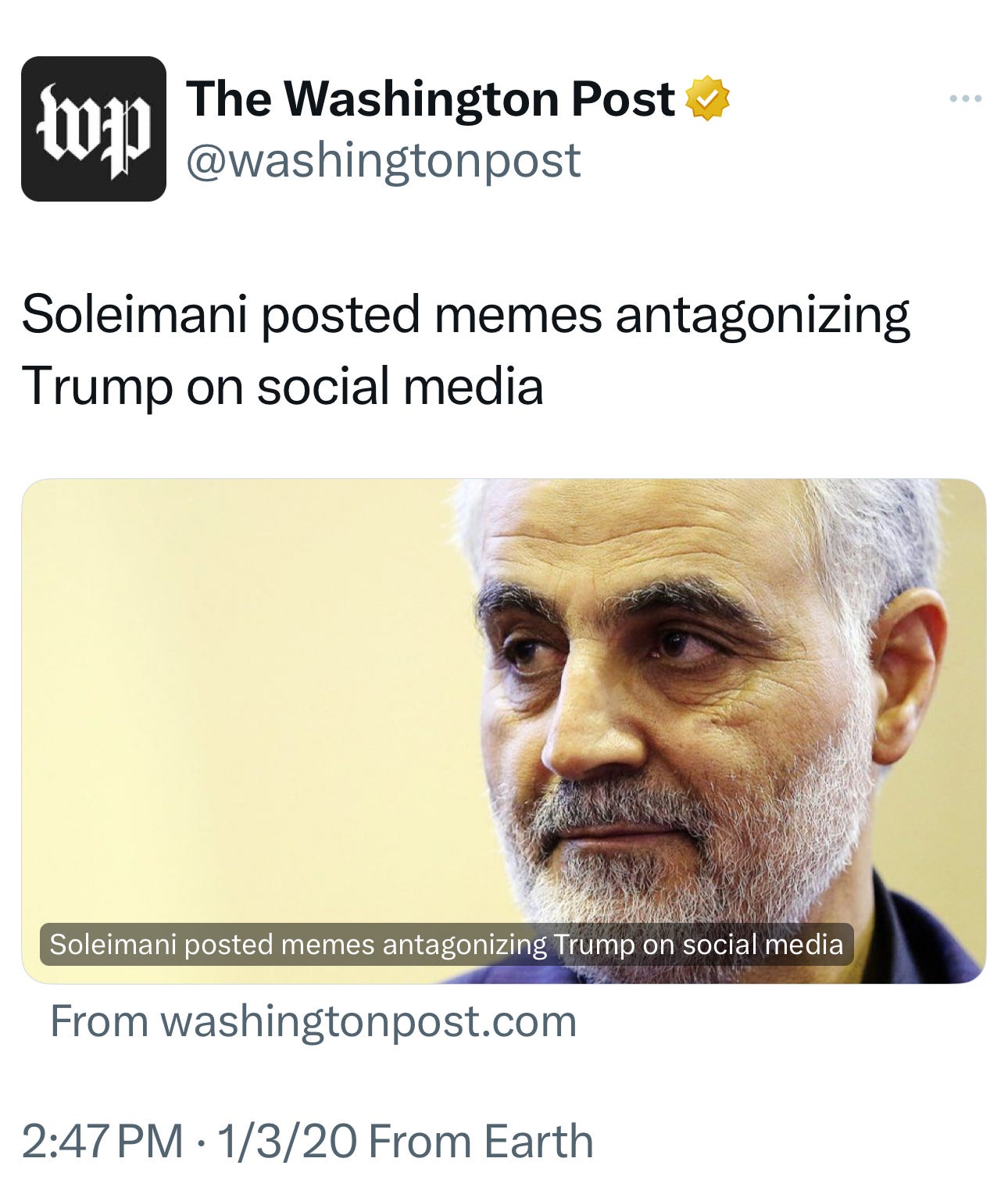

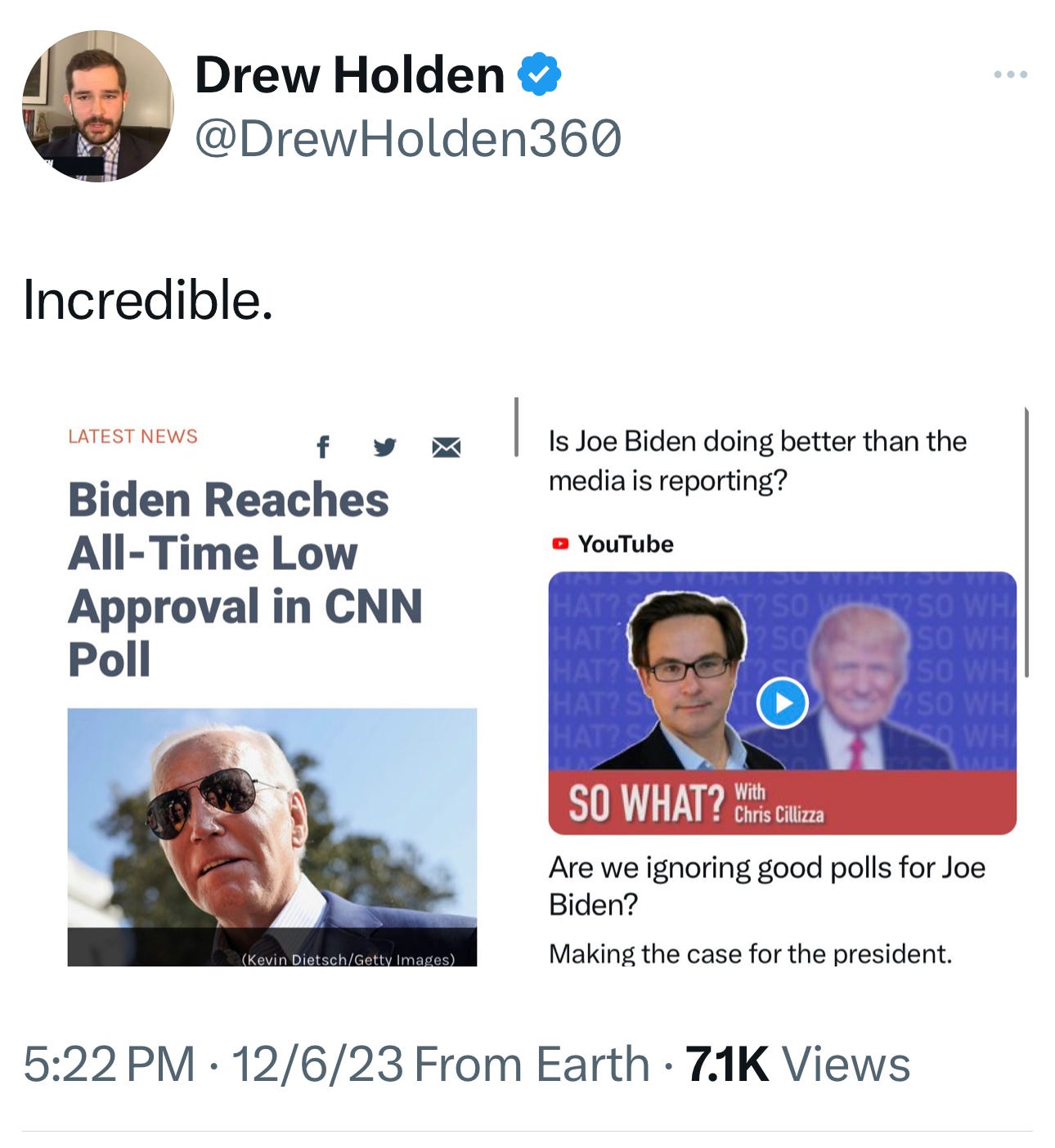

Thanks! Great reporting on these clowns! Their TDS has no limit. I despise them and the damage they do and have done to our society. Well done!
This is excellent. Can you compare the death coverage of Sulemeini during Trump's presidency, with the death coverage of Bin Laden during Obama's?